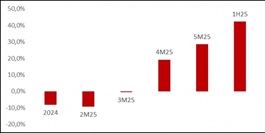Legal reins evolved in e-commerce
Legal reins evolved in e-commerce
In the context of Vietnam’s e-commerce market entering a new phase of development, tightening legal regulations are placing increasing demands for compliance on all stakeholders.

A new law aims to enhance state management efficiency and promote healthier e-commerce growth, photo Le Toan |
The Centre for E-commerce and Digital Technology Development (eComDX) under the Ministry of Industry and Trade (MoIT), in collaboration with TikTok Shop, launched a legal training programme for e-commerce on June 25 in Hanoi.
As part of the event, a panel discussion on sustainable business was held, featuring experts from the E-commerce and Digital Economy Agency (iDEA), the General Department of Taxation, representatives from TikTok Shop, and BIDV.
Nguyen Lam Thanh, representative of TikTok Vietnam, stated that the introduction of new legal provisions requires a fundamental shift in mindset and operating methods.
“At this point in time, the e-commerce sector must also adapt to many new legal regulations. This demands a transition from a relatively spontaneous approach to a more professional and disciplined model,” Thanh said.
However, he also acknowledged that while this transition is necessary, it has created considerable pressure, from regulations on input goods and invoicing to tax calculations. Ambiguity around new policies is causing widespread confusion.
Nguyen Huu Tuan, director of eComDX, provided a comprehensive overview of the current legal framework, highlighting transformative changes that are redefining the responsibilities of both sellers and intermediary platforms.
“One of the most significant changes is the shift in liability for e-commerce platforms,” Tuan noted.
According to Tuan, since rules were introduced in 2013, many platforms have operated as intermediaries, merely providing a marketplace and not being held accountable for the goods sold by vendors. However, Decree No.85/2021/ND-CP from 2021 clearly states that if an e-commerce platform provides information services and charges sellers, it must bear joint liability in the event of violations.
This means platforms must now share responsibility for the quality and legality of transactions occurring on their systems.
In addition, the draft E-commerce Law introduces the principle of uniform legal application across both physical and digital environments.
“Conditional business sectors, such as alcohol or dietary supplements, must comply with all relevant permits and regulations even when operating online, just as they would under traditional sales models,” Tuan said. “E-commerce is merely a distribution channel and must not become a grey zone to circumvent legal obligations.”
To support modern governance and steer e-commerce towards sustainable development, the MoIT is currently drafting the new E-commerce Law. This aims to improve the legal framework, enhance state management efficiency, and promote sustainable e-commerce growth.
The draft also aims to resolve long-standing challenges such as verifying seller identities, tracking and addressing violations, controlling substandard goods, and enhancing consumer protection tools. Finalising the E-commerce Law is expected not only to meet international integration demands but also to open opportunities for the private sector to thrive in the digital age. The draft is scheduled to be submitted to the National Assembly for review in October.
Concurrently, managing tax obligations in e-commerce, especially for cross-border and social media commerce, remains a complex challenge requiring multifaceted solutions.
On the tax front, Nguyen Viet Hoa, head of Tax Management Department 2 under the E-commerce Tax Department of the Ministry of Finance, said that the tax authorities are prioritising the development of a coherent and effective tax framework for e-commerce.
“Regular updates and refinements are being made to keep pace with the rapid expansion of e-commerce platforms and cross-border trade. The goal is to level the playing field and combat tax evasion without hindering the growth of e-commerce,” said Hoa. “Currently, eTax and eTax Mobile systems have streamlined the tax declaration and payment process, improving transparency and saving time. Authorities are reviewing tax policies to ensure they do not become burdensome while still effectively preventing revenue loss.”
A dedicated portal for e-commerce household businesses, integrated with VNeID digital IDs and e-signatures, marks a major step towards tightening oversight while supporting sellers in legalising their digital operations, Hoa said. The use of digital signatures and VNeID also enhances security and convenience.
“Taxpayers should regularly update the software, double-check their information, and avoid submitting filings close to the deadline to prevent delays from system overload. The tax authority remains committed to supporting the digital business community to ensure smooth tax compliance,” Hoa added.
At the MoIT’s Q2 press conference on June 19, Hoang Ninh, deputy director general of iDEA, confirmed that the major policy proposals in the draft E-commerce Law had been approved by the government on June 18.
As part of efforts to modernise Vietnam’s e-commerce regulatory framework, the draft law introduces three pivotal policy shifts aimed at enhancing transparency, accountability, and consumer protection in the digital marketplace.
“Firstly, a new seller identification requirement will mandate that online vendors be linked to verifiable personal or business information, rather than displaying only shop names,” Ninh said. “Secondly, the draft law places greater responsibility on digital platforms, requiring them to proactively monitor, detect, and prevent violations. “This marks a shift from a reactive to a preventative enforcement approach,” Ninh said.
Thirdly, new rules will govern cross-border e-commerce platforms. Those without legal presence in Vietnam will be obliged to either establish a local entity or appoint an authorised representative, added Ninh.
- 09:29 11/07/2025



























